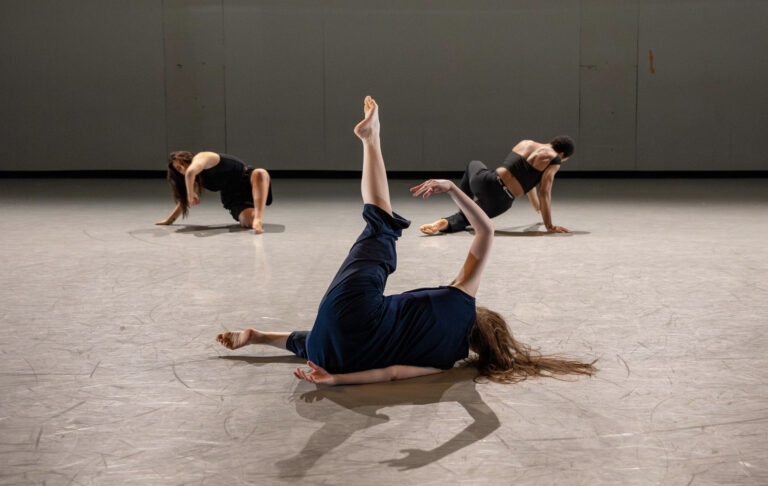
Betsy Brandt gets more than a few questions about what, exactly, she offers the choreographers she works with—the likes of Jennifer Monson and Sara Hook, to name a couple. “I help people make dances,” she says simply about her role as dance dramaturg. “Sometimes, it’s like being their composition teacher—except they know more than me, and I don’t have the power.”
As a longtime adjunct faculty member at Webster University in St. Louis, Missouri, Brandt has found significant overlap between her dramaturgy work and the comp and technique classes she teaches. Both involve letting the other party find their own way to the material, rather than adopting a proscriptive approach.
“I’m not a mentor.”
During her time as an MFA student at the University of Illinois at Urbana-Champaign, Brandt (who has a background in art history) became interested in the differences between the curatorial art world and the dance world. “My research question was pretty basic,” she says. “If dance is meant to be seen, why is the seeing of it not more a part of the development of the work? We create it in private, and then we vomit it out to the public at the end.” What if, she reasoned, a choreographer had the benefit of an outside observer throughout the creation of a new dance? Just the act of having someone else watch the work get created can change the outcome of the dance.
Brandt is quick to explain that her job is not to direct or shape the dances in any overt way. “Being a dramaturg isn’t hierarchical—I’m not a mentor,” she explains. “Instead, it’s a kind of consistent interest and engagement and talking and practice to effect or shape a dance’s ultimate endpoint.” She doesn’t stroke the choreographer’s ego, either. “It’s more of me asking, ‘How can I genuinely be interested and present and watching—and does that have an effect on the work?'” she says. She likens it to an eye doctor exam: “I’m the one asking, ‘Is the dance better with lens one or lens two?'”
“I wasn’t getting worse—my ear was getting better.”
That kind of watchful presence carries over into Brandt’s technique classes. “I talk a lot about students trying to empower their own drive, rather than depending on me for it,” she says. But that doesn’t mean she isn’t constantly finding ways to challenge them. “My classes are very physical,” she says. “I think that when students get physical feedback from themselves in the form of exhaustion or strength-building, that’s when they can start to recognize their accomplishments—through the physical exertion of a class.”
The physical demand often leads to a better understanding of alignment, she’s noticed. But understanding is very different from execution. “As dancers, they start to understand their bodies enough to know where some movement should be initiating from,” she says, “but they still have to get out from underneath their movement patterns. It can be really frustrating. They know what to do—it just takes time to digest it.” It’s similar to what Brandt herself experienced when she was learning to play flute in high school. “There was one time when I was playing in the orchestra pit for an operetta,” she says, “and I suddenly started to feel like I was getting worse.” Concerned, she asked her teacher if she was perhaps overworking or over-practicing. “She said it wasn’t that I was getting worse, but that my ear was getting better,” says Brandt. Her playing hadn’t yet caught up with her more developed musicality. Brandt sees that same delayed response in her dance students: “As a technique teacher, sometimes I have to trust that I’ve given them the information they need, and it’s going to take time for their bodies to actually swallow the idea,” she says.
“This is my work.”
Brandt is convinced that her role as a dramaturg has influenced her students in comp class, too. They view her not as someone who will critique their work but who will instead offer them tools to achieve whatever vision they have in mind. “I think my students get a sense that I don’t want them to please or not please me as the teacher,” she says. “As a dramaturg, I try to say, ‘What are you interested in? How are you solving that problem?’ The way one student will solve a problem is not the way someone else in their cohort will. That attitude has generally yielded some pretty experimental work in comp class.”
By focusing so much of her attention on the work of others, Brandt is occasionally confronted with the notion that she’s sacrificing her own creative drive. People ask her, “That’s great that you’re a dance dramaturg, but what about your own work?” “They have this idea that I’m somehow shorting myself in service of other people’s work,” she says. “But this is my work—this is where my research is, and it’s the most useful thing I can be contributing to the field.”




